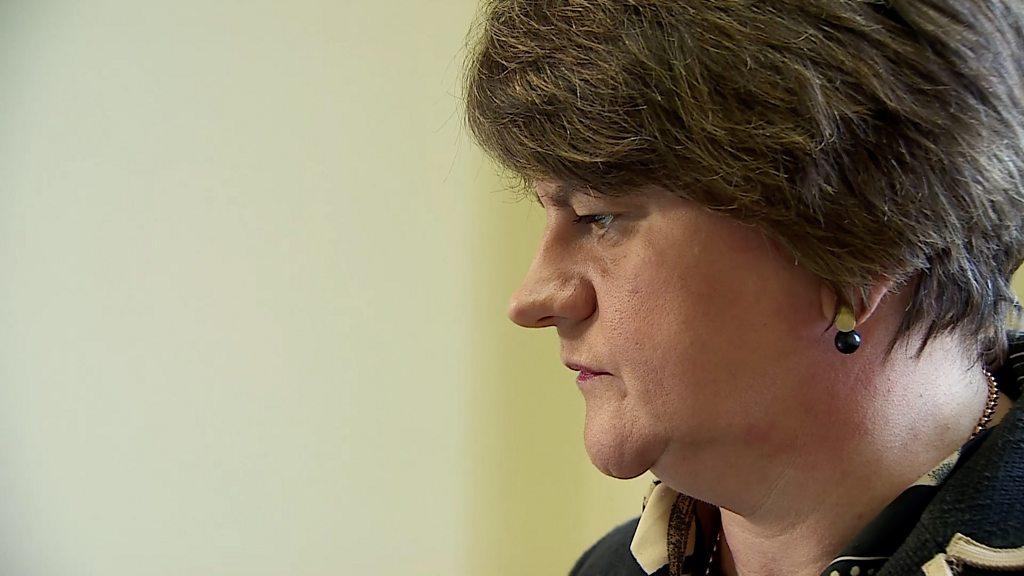Arlene Foster: Edwin Poots declares bid for support for DUP leadership
- Published
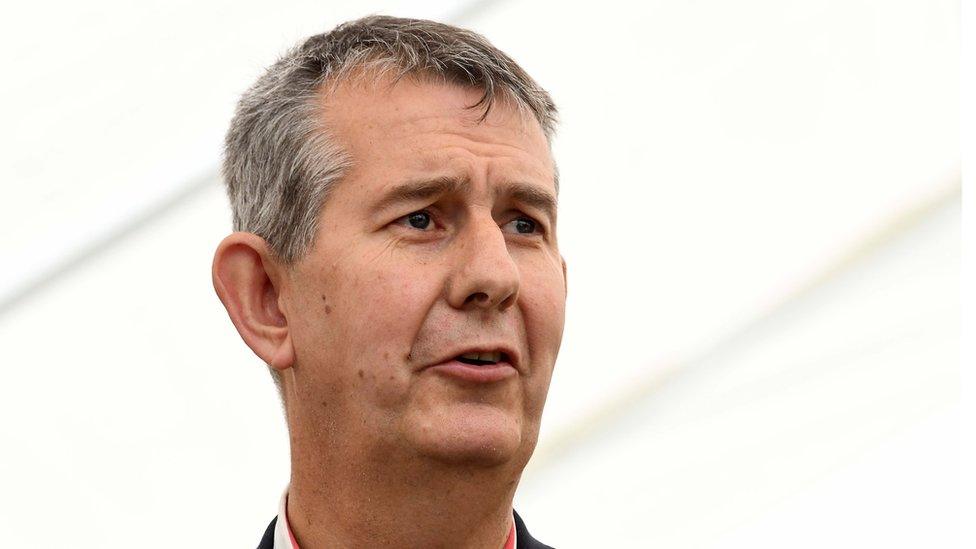
Edwin Poots is one of three DUP politicians tipped as a party leader contender
Stormont minister Edwin Poots has publicly put his name forward to be the next leader of the Democratic Unionist Party (DUP).
The party has begun the process of appointing a new leader after Arlene Foster's resignation.
She will step down as DUP leader on 28 May and as first minister of Northern Ireland at the end of June.
Mr Poots is one of three DUP politicians tipped as a potential party leader.
He has been a member of the DUP for all of his political career and is Northern Ireland's agriculture and environment minister.
In a video message posted on his Twitter account on Thursday, Mr Poots paid tribute to Mrs Foster.
He said he looked forward to the engagement and debate with colleagues and the wider public "in this contest".
The support of a majority of the party's 27 members of the Northern Ireland Assembly will be crucial to Mr Poots' hopes of replacing Mrs Foster as leader.
The first senior figure within the DUP to publicly back Mr Poots was assembly member Christopher Stalford, who said his friend had the "experience and talents to take our country and our party forward".
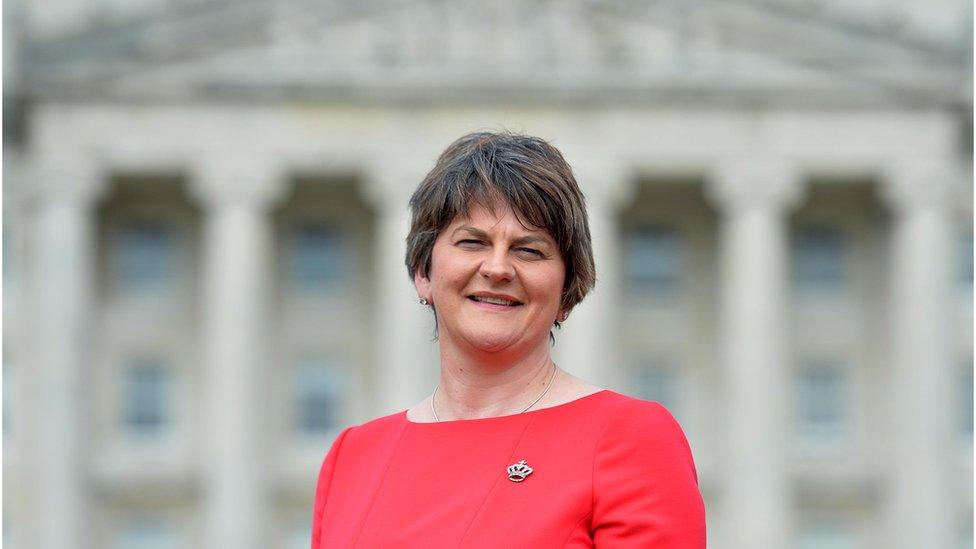
Arlene Foster became DUP leader in December 2015
Earlier, a source said Mr Poots has a "big advantage over any MP who might be in the running".
"That is because there is a feeling in the assembly group that they were left out of the loop by the party leadership and that is why so many signed the motion of no confidence in Arlene Foster."
Mrs Foster, 50, announced her resignation on Wednesday after a letter of no confidence in the party leadership was signed by about 80% of its Stormont and Westminster ranks.
The outgoing first minister said it was important to give space over the coming weeks for the party officers to make arrangements for the election of a new leader.
Who could replace Mrs Foster?
There has been speculation of a split role, with one person as first minister at Stormont and a second as party leader at Westminster.
Possible contenders not only include Mr Poots but also Lagan Valley MP Sir Jeffrey Donaldson and East Belfast MP Gavin Robinson, although the latter two have yet to make their position clear.
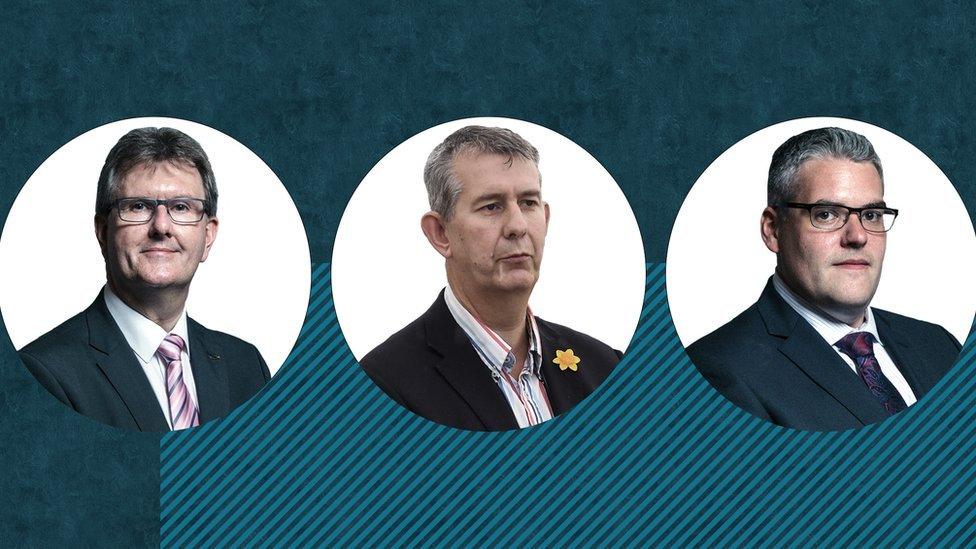
Possible leadership contenders include Sir Jeffrey Donaldson, Edwin Poots and Gavin Robinson
Speaking to BBC News NI on Friday, former Taoiseach Bertie Ahern urged Stormont parties not to allow the change of DUP leadership to destabilise the power-sharing institutions.
"That would be a disaster - I think instability just leaves everybody in a bad place," he said.
"Governments all over the world nowadays have coalition partners - these should be seen as normal processes.
"I know there are problems but the big picture is stable society, seeing your economy develop and to see the pandemic dealt with."
Mr Ahern - a key architect of the Good Friday peace agreement - told Newstalk Radio there could be a "wobbly road ahead" if Sinn Féin was to become the largest party in Northern Ireland and take the job of first minister.
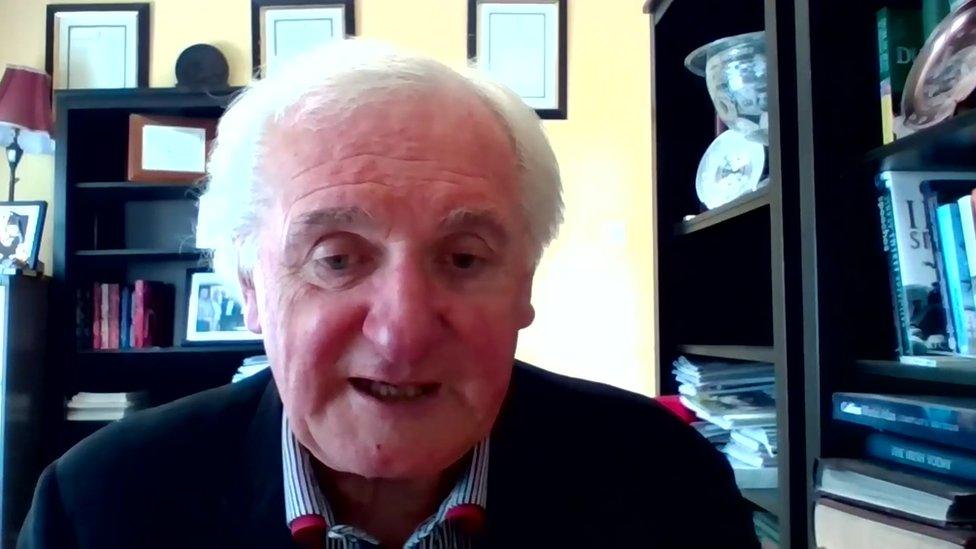
Bertie Ahern says potential instability at Stormont would leave everybody "in a bad place"
He said he had not anticipated the "swiftness" of Mrs Foster's departure but added that it was "no secret that there was a lot of discontent within the DUP over a prolonged period".
He said there was "a lot of talk around Christmas time that Mr Poots would mount some kind of a coup".
"But then [Mr Poots] got sick and stood down for a while so... it looked like things were alright [for Mrs Foster]," he added.
'Shrewd head'
On Thursday, DUP MLA Jim Wells, who lost the party whip at Stormont in 2018 after criticising the leadership, said he believed that Mr Poots was the frontrunner for the party leadership.
Mr Wells has already expressed support for Mr Poots and there may be a move to return the whip to him.
He said Mr Poots had vast experience and a "shrewd head on his shoulders".
A new DUP leader is likely to be elected before the end of May but a senior party source says Sinn Féin may demand concessions on the Irish language or LGBT rights before agreeing to the election of a new first minister.
"I don't think any of them have gamed out what is likely to happen now," said the source, who asked not to be named.
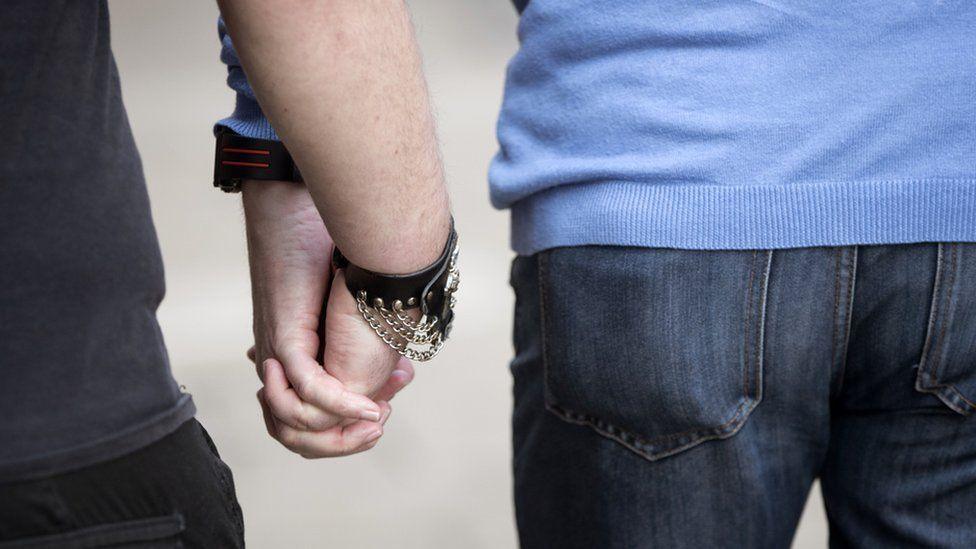
A senior DUP source says Sinn Féin may demand concessions on the Irish language or LGBTQ rights before agreeing to a new first minister
The source also said that removing Mrs Foster was a "total mess" that could lead to a Stormont election this year, even though the next vote for the power-sharing assembly is not due to take place until May 2022.
Sinn Féin's Michelle O'Neill - the deputy first minister leading the Stormont executive along with Mrs Foster - said the "incoming DUP leader should recognise that the political landscape across our island has changed".
"Within the executive and assembly, Sinn Féin will work with all parties to progress social reform, political change and economic prosperity but we will robustly oppose damaging policies or regressive throwback politics of the past."
Without Sinn Féin support, a new first minister cannot be elected.
A DUP source told BBC News NI: "I would expect negotiations to take place over the election of a new first minister but Sinn Féin will seek to extract movement on a number of issues.
"Unless there is a agreement I can see the issue being allowed to drift over the summer when not much happens and then a possible election in the autumn."
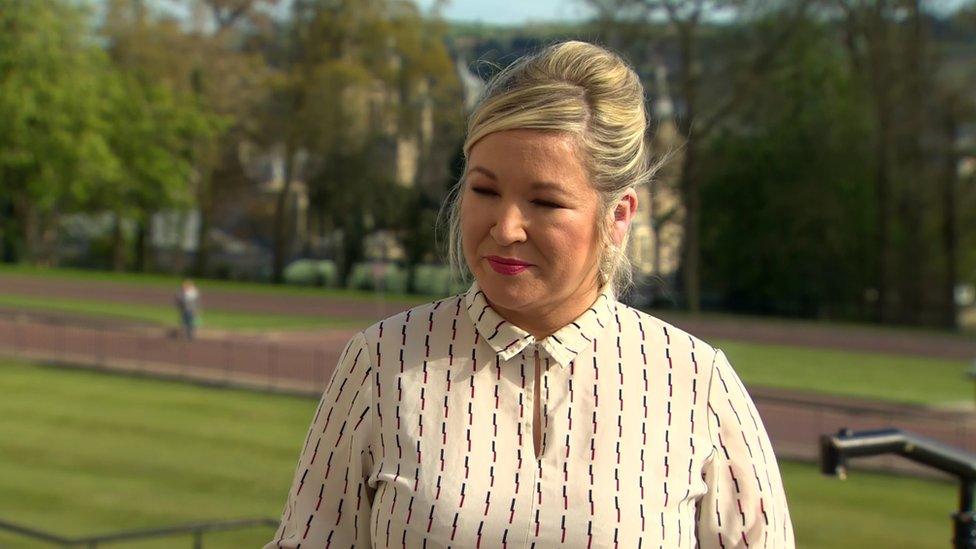
Michelle O'Neill says she had a decent if challenging relationship with Mrs Foster
Sinn Féin Finance Minister Conor Murphy said it would be difficult for the executive to work when the DUP was "in such a state of turmoil".
"The DUP [has] been at war with itself and that disfunction has impacted on the executive and impacted on our ability to do business."
Mr Murphy said it would be "irresponsible" to have an election before May next year.
"We all have a responsibility to try and manage the situation through to then and we can't allow turbulence within one party to contaminate the rest of the executive in that regard," he said.
Alliance Party leader and Justice Minister Naomi Long said she believed Mrs Foster had been made a scapegoat for the DUP's "strategic errors".
Irish Foreign Minister Simon Coveney said he was worried about politics in Northern Ireland and was surprised at the pace of Mrs Foster's resignation.
"Politics in Northern Ireland [is] fragile, it's very divisive, opinions are very polarised," he said.
"People like me and others have to find a way of building relations that can cope with that division and give political leadership at a time when it's badly needed."
How would a leadership election work?
Only a small number of the DUP membership - MLAs (Members of the Legislative Assembly) and MPs - will get to vote in a leadership contest.
There are 27 MLAs that hold the party whip - including Mrs Foster - and eight MPs.
If a contest does take place it will be the first in the DUP's 50-year history.
DUP rules state that a leadership election should be called by 30 April, although that date could potentially pass.
'Who is going to replace Arlene? I don't know who can'
Party officers will ultimately decide the selection process.
Normally the leadership election is simply a formality and the existing leader continues in their role but other candidates are free to challenge them.
The role of first minister is separate but as the largest party from the largest grouping (unionism) in the assembly, the DUP is entitled to nominate someone to hold the post of first minister.
Once Mrs Foster steps down as first minister, the DUP would then be asked to nominate a replacement within seven days and a vote would be held in the assembly.
If a replacement is not nominated the Northern Ireland secretary is obliged to call an assembly election.
How did we get here?
Mrs Foster has endured a turbulent time as DUP leader and the fallout from Brexit - which the party supported - has put particular pressure on the party's top brass as it faces having to weather the storm caused by the Northern Ireland Protocol, which imposed a border down the Irish Sea.
The aftermath of Brexit caused friction both internally and between the party and some of its core voters who are unhappy at the deal which led to the Irish Sea border.
"It has been the privilege of my life to serve the people of Northern Ireland"
It has also been suggested recent changes to Northern Ireland's abortion laws and the commitment to implement an Irish language act were causing concerns with some elected DUP representatives ahead of next year's assembly election.
On Tuesday it emerged a letter of no-confidence was circulated among the party's MLAs and MPs - more than 20 assembly members and four MPs are understood to have signed it.
There was also pressure from councillors, with concerns ranging from the Northern Ireland Protocol, abortion legislation, same-sex marriage, policing and the recent gay conversion debate at Stormont.
What has been said about Arlene Foster herself?
Mrs Foster has been DUP leader since December 2015.
The following month, she was appointed first minister of Northern Ireland, becoming the first woman and the youngest person to hold both jobs.
Colleagues from across the political divide have sent their best wishes to Mrs Foster.
Deputy First Minister Ms O'Neill said the pair had a decent if challenging relationship.
Prime Minister Boris Johnson thanked Mrs Foster "for her dedication to the people of Northern Ireland".
Allow X content?
This article contains content provided by X. We ask for your permission before anything is loaded, as they may be using cookies and other technologies. You may want to read X’s cookie policy, external and privacy policy, external before accepting. To view this content choose ‘accept and continue’.
Northern Ireland Secretary Brandon Lewis said Mrs Foster was a dedicated public servant who had inspired young women to follow her example and go into politics.
Taoiseach (Irish PM) Micheál Martin said he had a "positive working relationship with Arlene".
"In particular I valued the constructive engagement, notwithstanding our differences, we have had in our respective roles as taoiseach and first minister," he said.
- Published14 May 2021

- Published28 April 2021
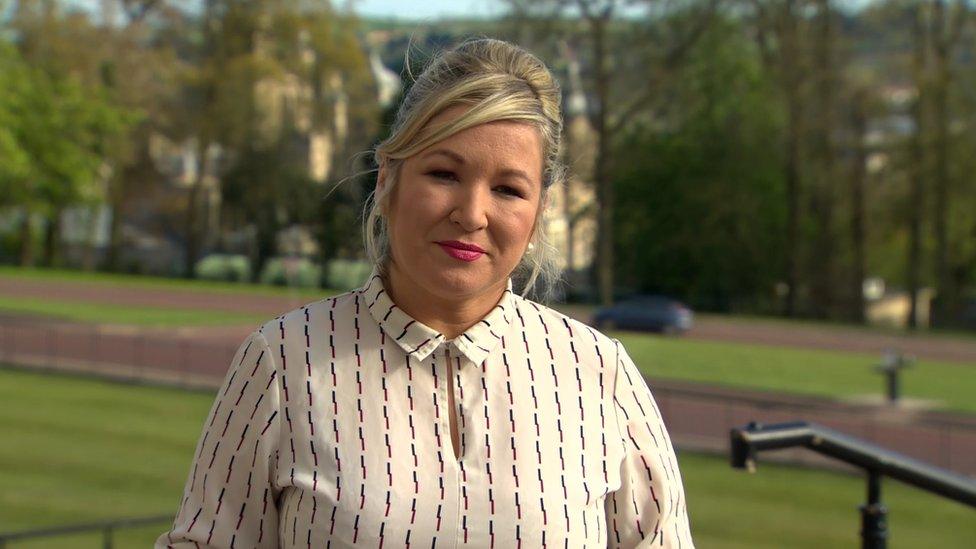
- Published14 June 2021
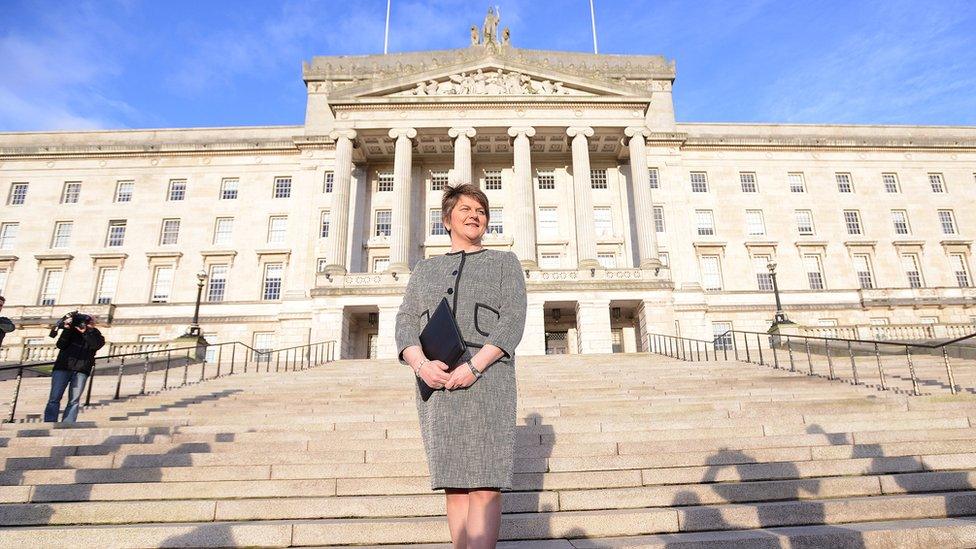
- Published28 April 2021
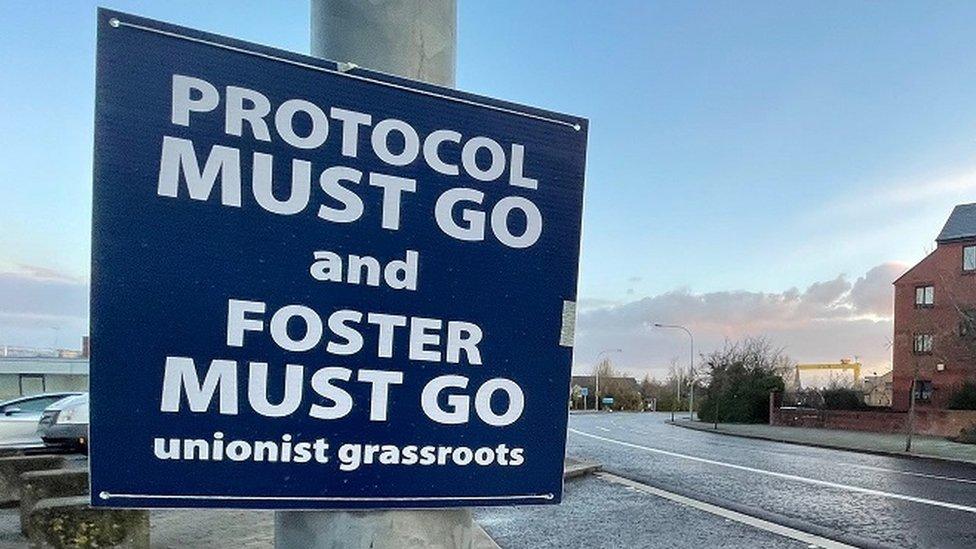
- Published28 April 2021
